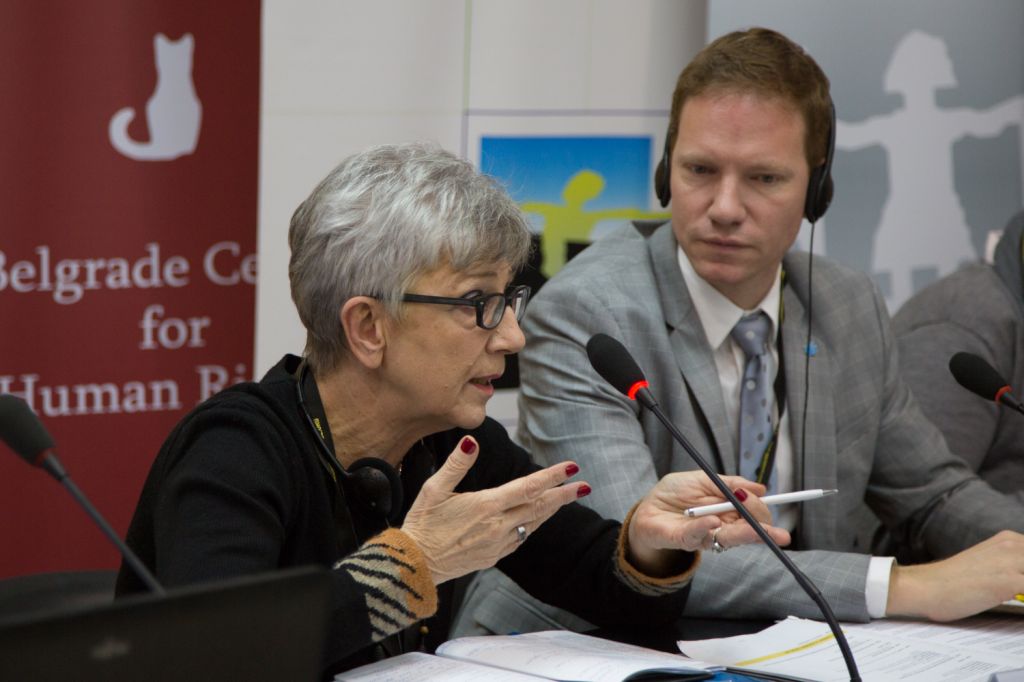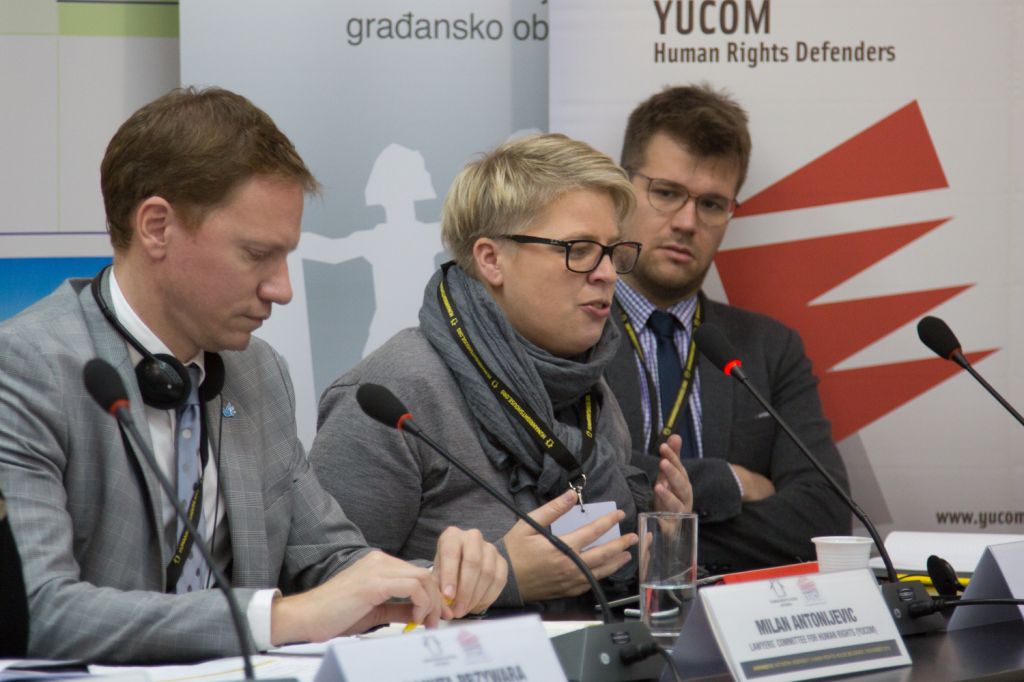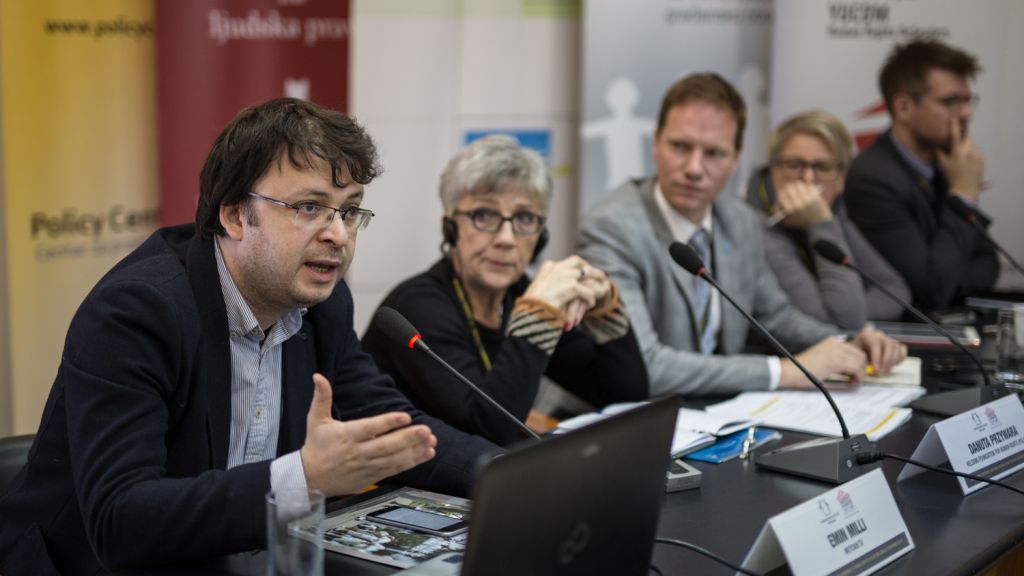Milan Antonijevic, Human Rights House Belgrade, introduced the need to develop an adequate civil society response. He also outlined some of the populist trends witnessed across Europe, including people or parties winning elections by promising nothing concrete, the weakening of constitutions and media, and governments discrediting their opposition and critics.
The panellists first gave their perspectives on illiberal democracy, coming from Hungary, Poland, Croatia, and Azerbaijan.
Eszter Polgari, Central European University branded Hungary “a leader in building illiberal democracy,” and confirmed that all of the steps mentioned had materialised in the country. She outlined “amendments on symbolic values added to the constitution, completely without public discussion,” as well as “the dismantling of checks and balances and changes to ensure independent institutions are loyal.” She detailed government harassment of civil society organisations, and commented that recent developments such as the refugee situation had made it easy to “demonise civil society organisations” and make them “the public enemy.”
Danuta Przywara, Head of the Polish Helsinki Foundation for Human Rights, said that in Poland the situation has looked similar to Hungary since the Law and Justice Party won in 2015. But she drew attention to a few differences: the government does not have the constitutional majority to change the constitution, and it is not led by a president, as the president is just executing the decisions of the chairperson of the Law and Justice party – only a parliament member, but he takes all the decisions. Przywara commented that the authorities had launched initiatives to “intensively buy the support of the people.”

Danuta Przywara and Milan Antonijevic speak on illiberal democracies
Ivan Novosel, Human Rights House Zagreb, told how Croatia does not share the same experiences as Hungary and Poland, “because the government didn’t last that long.” He expressed how the human rights situation deteriorated after Croatia signed the accession treaty with the EU, when “traditional Croatian nationalism combined with neo-Christian right wing conservatism to attack women and LGBT rights.” Novosel explained how this was an introduction to what happened two years later, when within a few months of coming to power the new government conducted a tripartite attack on human rights. This included the spread of hate speech undermining civil society funding, rejection of the report of the Ombudsman, and attacks on independent media and the state broadcaster. Novosel commented: “All non-profit media workers are basically on the street, unable to work in their profession.”
Emin Milli, Director of Meydan TV, began by dismissing the previous approach to deal with dictatorships: “Democracies engaged dictatorships, based on idea the economy would lead to positive changes. We need to scrap this idea.” He said that democracies should not take things for granted and think that the following election will be an opportunity to get rid of the current leader, as there might not be another opportunity to have a normal kind of election. He said: “We are repeating what happened in the 1930s, when democracies gave up voluntarily the power and state machines were hijacked.”
He advised: “Civil society and independent media should not spend energy on long reports. We have to make our work more attractive and popular.” Further, he said: “there is no such thing just as human rights work… we need to mix art, journalism, and social media to reach out to more people… and to make business and capitalism work for human rights organisations.”

Eszter Polgari (centre) speaks on illiberal democracy
Members of the Human Rights Houses discussed whether the international community is paying enough attention and reacting to these trends.
Danuta Przywara explained that liberal democracies “do not have effective tools to respond when a member of the system, such as a political party, does not obey the rules.” Despite this, she said the letter signed by 90 NGOs from different countries to the Polish government prompted a strong reaction; it did have an impact.
Ivan Novosel responded: “The general impression in Croatia is that the international community was not involved on human rights, and the EU was standing outside of the whole story.” He warned: “When people want fast social and economic change, they turn to populists… We should stay present, stay awake, follow what is happening in society and warn what is wrong, and stand firmly with human rights values.”
Mehman Aliyev, Turan Information Agency, questioned the term illiberal democracy: “If you breach one criterion, you should be labelled authoritarian, not a liberal or illiberal democracy. A state should be stopped once it crosses this line.”
Eszter Polgari responded to this: “Even if we don’t like illiberal democracy. It is still democracy, the policies are decided upon within the rule of law and are a threat to the rule of law. We voted for these people. NGOs should remain engaged in politics, especially if there is no other force. We still have European standards, the ombudsman, others. Civil society should still engage with these mechanisms.”
Emin Milli encouraged a clearer and more creative response: “The clear messages are coming from the right wing. We need to reach out to people as they do, with clearer communication. Civil society organisations can play a bigger role, not in politics, but in communicating the values that we stand for. We must build up powerful alliances with media. Civil society must experiment and invest more in crazy ideas, and push into unknown territory.”
These discussions have given a view of illiberal trends and the challenges they present, but questions remain about our plans to resist these trends and overcome these challenges. The Human Rights Houses are developing a toolkit to help with this, to enhance civil society’s ability to resist these developments.





